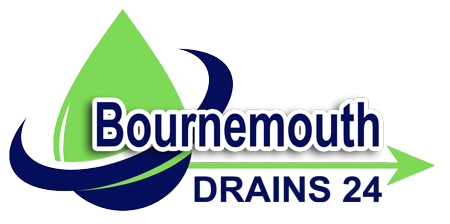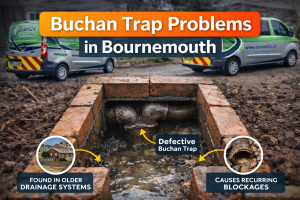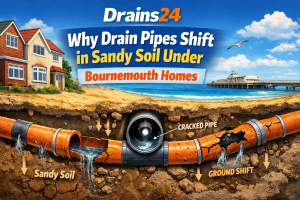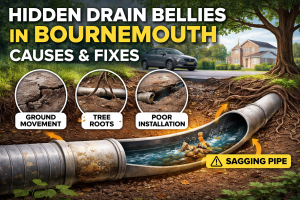Blocked drains are one of the most common issues affecting homes across Bournemouth — from Boscombe and Southbourne to Winton, Charminster and the town centre. When pipes slow down or back up, homeowners usually ask the same question:
“Is jetting better, or should I use rodding?”
Both methods clear blockages, but they work very differently and are suitable for different situations. This guide explains the advantages, limitations, and best applications of jetting vs rodding, so Bournemouth residents can make an informed decision.
Understanding the two methods
What is drain rodding?
Rodding uses a series of flexible rods that screw together and are manually pushed into the drain. They break up soft blockages — mainly caused by wipes, tissue, food, or minor debris.
Rodding has been used for decades and is still effective when the blockage is close to the surface and not compacted.
What is high-pressure water jetting?
Jetting forces water through a hose at up to 4,000 PSI, blasting through stubborn blockages, grease, fat, silt, scale, and roots.
Professional jetting equipment used by Bournemouth Drains24 is far more powerful than domestic tools and is safe when operated by trained engineers.
Jetting vs rodding — which is better?
Both have their place, but they perform differently depending on the type and depth of blockage.
1. Clearing grease and fat buildup
Winner: Jetting
Kitchen drains in Bournemouth frequently block due to fat, oil and food waste — particularly in rental properties and HMOs. Rodding simply pokes a channel through the grease. Jetting fully removes the buildup, preventing the blockage from returning.
2. Removing wipes and soft debris
Winner: Rodding (initially)
Soft blockages near the gully or first bend can be rodded quickly. However, if wipes are compacted deep within the system, jetting becomes necessary.
3. Breaking down scale and hard deposits
Winner: Jetting
Bournemouth’s water hardness leads to limescale inside old pipework. Jetting strips scale from the walls, restoring full pipe diameter. Rodding cannot remove it.
4. Clearing outdoor gullies
Winner: Jetting
Leaves, sand and silt accumulate in coastal areas like Westbourne and Alum Chine. Jetting flushes these away. Rodding often becomes stuck in uneven gully shapes.
5. Tree root intrusion
Winner: Jetting (combined with root cutting)
Fine roots can be flushed out with jetting. Larger roots need mechanical cutting — but rodding is ineffective in root-affected systems.
6. Preventing recurring blockages
Winner: Jetting
Jetting cleans the entire pipe, not just the obstruction, reducing the chance of repeat problems — especially useful in older clay systems common in Bournemouth.
When rodding is the better choice
While jetting is more powerful, rodding still has valid uses:
- Blockage is close to the entry point
- Soft obstruction like wipes or toilet tissue
- When the property has sensitive or fragile pipework
- When water access is limited
Rodding is also faster for simple callouts and can be more cost-effective for minor blockages.
When jetting is essential
Choose jetting when dealing with:
- Grease and fat
- Silt and mud
- Limescale
- Root intrusion
- Repeated blockages
- Deep blockages far along the line
- Unknown blockages requiring CCTV
For a thorough clean that prevents future issues, jetting is the superior method.
Protecting Bournemouth homes with the right method
With a mix of coastal weather, older pipe systems, and heavy rental turnover, Bournemouth drainage requires robust maintenance.
At Bournemouth Drains24, engineers carry both jetting equipment and rods, allowing them to choose the right method based on the exact conditions of your pipes.
Both jetting and rodding have their advantages — the best method depends on the type of blockage and the condition of your drains.
📞 Call Drains24 for expert drain clearance in Bournemouth — available 24/7 for fast, reliable service.
Drain Jetting or Rodding FAQs
Is jetting or rodding better for clearing blocked drains?
Jetting is usually more effective because it removes grease, fat, silt and scale from the pipe walls, not just the obstruction. Rodding works well for soft blockages near the drain entrance but is less effective for deeper or compacted blockages.
Is jetting safe for Bournemouth’s older pipe systems?
Yes. When used by trained engineers, high-pressure jetting is safe for clay and PVC pipework. Pressure is adjusted depending on the pipe material and condition, ensuring a controlled and safe clean.
When should I choose rodding instead of jetting?
Rodding is suitable when the blockage is near the gully or first bend, and when the obstruction is soft, such as wipes or tissue. It’s also a quick and cost-effective option for straightforward blockages.
Can jetting prevent future blockages?
Yes. Jetting removes grease, fat, silt and scale that accumulate inside the pipe, helping prevent recurring blockages. It is especially beneficial for properties with older drainage systems.
How do I know which method my Bournemouth property needs?
If the blockage is recurring, deep within the system, or caused by grease or scale, jetting is likely best. For simple surface-level blockages, rodding may be enough. Drains24 engineers assess on-site and choose the safest, most effective method.




